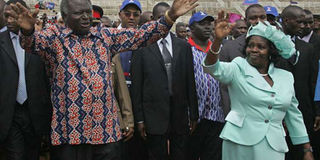Silences, struggles that awoke former First Lady’s demons

Former President Mwai Kibaki and his late wife Lucy Kibaki wave to supporters in Nairobi on November 15, 2007. For the 10 years Mrs Lucy Kibaki was First Lady, Kenya walked on eggshells around her. FILE PHOTO | NATION MEDIA GROUP
What you need to know:
- Journalist Salim Lone’s post on his Facebook profile this week forces a moment of introspection about First Lady Lucy Kibaki.
- “She used to occasionally infuriate friends and foes alike with unusual/emotional behaviour, but media was generally downright brutish in its coverage of her - it was totally insensitive to her health struggles. The profit motive can be too strong, including for media,” he wrote.
- For the 10 years Mrs Lucy Kibaki was First Lady, Kenya walked on eggshells around her.
- Her first public appearance as the president’s spouse was a study in sartorial spectacle.
Journalist Salim Lone’s post on his Facebook profile this week forces a moment of introspection about First Lady Lucy Kibaki.
“She used to occasionally infuriate friends and foes alike with unusual/emotional behaviour, but media was generally downright brutish in its coverage of her - it was totally insensitive to her health struggles. The profit motive can be too strong, including for media,” he wrote.
For the 10 years Mrs Lucy Kibaki was First Lady, Kenya walked on eggshells around her.
Her first public appearance as the president’s spouse was a study in sartorial spectacle.
Having shut the State House bar, where newly minted politicos and policy eggheads congregated for a swig of whisky, she inhabited a private world in which peace was a paramount goal, interrupted only occasionally by curious shopping trips into the city centre.
Mrs Kibaki’s big cause was the First International Aids Run in 2003, but she had issues with youth access to condoms, counselling abstinence instead.
The dexterity required to manage the First Lady, her interests and strong opinions included, was not apparent until a newspaper where I worked in 2003 sought to publish a story about a woman widely known in the President’s Othaya Constituency as his second wife.
She had tales to tell and photographic evidence of a historical and close relationship with the Kibakis.
WAMBUI CLAIMS
One of the sharpest journalistic tools in the box was sent to re-interview Ms Mary Wambui about her claims, and then we called the head of the President’s press service for a reaction.
Yes, the President’s life choices were his alone - but he owed the country a level of transparency about the people who were close to him.
That anxiety was given life in 2005 when Ms Wambui and her daughter were embroiled in an embarrassing saga about two Armenians at the centre of serious security breaches at sensitive sites in the country.
The response sought from State House on the initial story came in the form of a visit by a man who claimed to work for the then National Security Intelligence Service.
He asked, no, demanded to rewrite the story and was politely but firmly discouraged by my managing editor. He left mouthing dark menaces.
That day, the paper that was fast gaining notoriety for late arrivals on the market went to press early, with the printing manager encouraged to visit his rural home in Kangundo.
The managing editor and I switched off our telephone sets and went underground.
SEX AND POLITICS
The bigger competitor Sunday newspaper had a more salacious headline about five MPs, including three Cabinet ministers, caught on Koinange Street, Kenya’s unofficial red light district, soliciting, purchasing or enjoying pleasures of the flesh.
As it turned out, the story of sex and politics was a donation from the State that failed to stand up in court, but its use demonstrated the lengths to which powerful individuals were willing to go to protect the First Lady’s peace of mind.
I feel deeply conflicted about the decision we took to publish the story with the headline: ‘Kibaki’s second wife speaks out’ in December 2003.
Later, while the President was holidaying in Mombasa, the First Lady reportedly expelled or locked out several politicians, among them Cabinet ministers seen as excessively patronising Mr Kibaki.
The First Lady’s insecurity was pricked when in a slip of the tongue, Vice President Moody Awori referred to ‘the second lady’.
It abruptly ended the New Year’s Eve party. Any hint of recognition for Ms Wambui seemed to provoke the First Lady incalculably.
One of the most incongruous moments in President Kibaki’s public appearances must be the day he summoned the media to State House to explain, with the First Lady standing slightly ahead of his podium, that he had only one dear wife.
Her demeanour, and previous conduct, signalled her need for the media’s protection rather than scrutiny.





